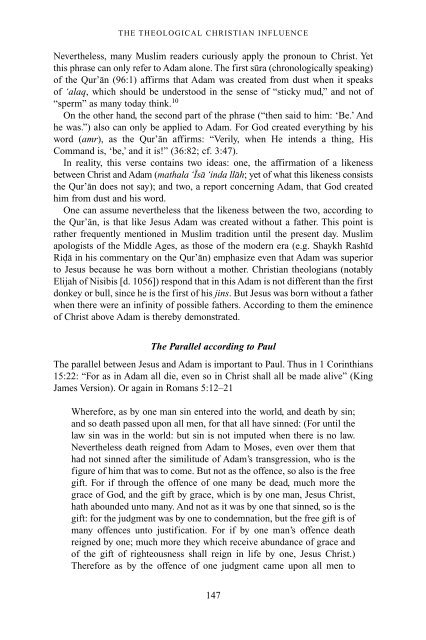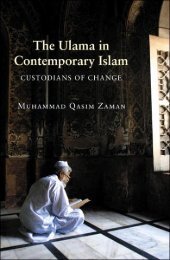The Qur'an in its historical context (pdf - Islam and Christian-Muslim ...
The Qur'an in its historical context (pdf - Islam and Christian-Muslim ...
The Qur'an in its historical context (pdf - Islam and Christian-Muslim ...
You also want an ePaper? Increase the reach of your titles
YUMPU automatically turns print PDFs into web optimized ePapers that Google loves.
THE THEOLOGICAL CHRISTIAN INFLUENCE<br />
Nevertheless, many <strong>Muslim</strong> readers curiously apply the pronoun to Christ. Yet<br />
this phrase can only refer to Adam alone. <strong>The</strong> first sura (chronologically speak<strong>in</strong>g)<br />
of the Qur’an (96:1) affirms that Adam was created from dust when it speaks<br />
of ‘alaq, which should be understood <strong>in</strong> the sense of “sticky mud,” <strong>and</strong> not of<br />
“sperm” as many today th<strong>in</strong>k. 10<br />
On the other h<strong>and</strong>, the second part of the phrase (“then said to him: ‘Be.’ And<br />
he was.”) also can only be applied to Adam. For God created everyth<strong>in</strong>g by his<br />
word (amr), as the Qur’an affirms: “Verily, when He <strong>in</strong>tends a th<strong>in</strong>g, His<br />
Comm<strong>and</strong> is, ‘be,’ <strong>and</strong> it is!” (36:82; cf. 3:47).<br />
In reality, this verse conta<strong>in</strong>s two ideas: one, the affirmation of a likeness<br />
between Christ <strong>and</strong> Adam (mathala ‘Isa ‘<strong>in</strong>da llah; yet of what this likeness consists<br />
the Qur’an does not say); <strong>and</strong> two, a report concern<strong>in</strong>g Adam, that God created<br />
him from dust <strong>and</strong> his word.<br />
One can assume nevertheless that the likeness between the two, accord<strong>in</strong>g to<br />
the Qur’an, is that like Jesus Adam was created without a father. This po<strong>in</strong>t is<br />
rather frequently mentioned <strong>in</strong> <strong>Muslim</strong> tradition until the present day. <strong>Muslim</strong><br />
apologists of the Middle Ages, as those of the modern era (e.g. Shaykh Rashid<br />
Rida <strong>in</strong> his commentary on the Qur’an) emphasize even that Adam was superior<br />
to Jesus because he was born without a mother. <strong>Christian</strong> theologians (notably<br />
Elijah of Nisibis [d. 1056]) respond that <strong>in</strong> this Adam is not different than the first<br />
donkey or bull, s<strong>in</strong>ce he is the first of his j<strong>in</strong>s. But Jesus was born without a father<br />
when there were an <strong>in</strong>f<strong>in</strong>ity of possible fathers. Accord<strong>in</strong>g to them the em<strong>in</strong>ence<br />
of Christ above Adam is thereby demonstrated.<br />
<strong>The</strong> Parallel accord<strong>in</strong>g to Paul<br />
<strong>The</strong> parallel between Jesus <strong>and</strong> Adam is important to Paul. Thus <strong>in</strong> 1 Cor<strong>in</strong>thians<br />
15:22: “For as <strong>in</strong> Adam all die, even so <strong>in</strong> Christ shall all be made alive” (K<strong>in</strong>g<br />
James Version). Or aga<strong>in</strong> <strong>in</strong> Romans 5:12–21<br />
Wherefore, as by one man s<strong>in</strong> entered <strong>in</strong>to the world, <strong>and</strong> death by s<strong>in</strong>;<br />
<strong>and</strong> so death passed upon all men, for that all have s<strong>in</strong>ned: (For until the<br />
law s<strong>in</strong> was <strong>in</strong> the world: but s<strong>in</strong> is not imputed when there is no law.<br />
Nevertheless death reigned from Adam to Moses, even over them that<br />
had not s<strong>in</strong>ned after the similitude of Adam’s transgression, who is the<br />
figure of him that was to come. But not as the offence, so also is the free<br />
gift. For if through the offence of one many be dead, much more the<br />
grace of God, <strong>and</strong> the gift by grace, which is by one man, Jesus Christ,<br />
hath abounded unto many. And not as it was by one that s<strong>in</strong>ned, so is the<br />
gift: for the judgment was by one to condemnation, but the free gift is of<br />
many offences unto justification. For if by one man’s offence death<br />
reigned by one; much more they which receive abundance of grace <strong>and</strong><br />
of the gift of righteousness shall reign <strong>in</strong> life by one, Jesus Christ.)<br />
<strong>The</strong>refore as by the offence of one judgment came upon all men to<br />
147



